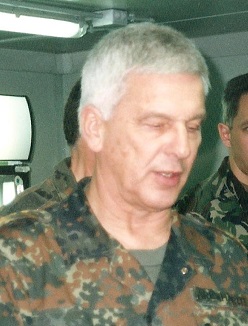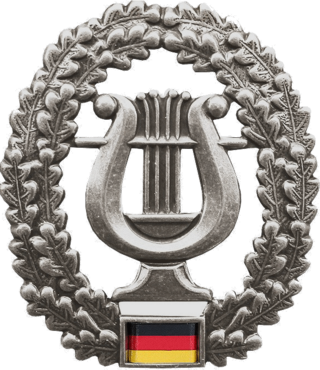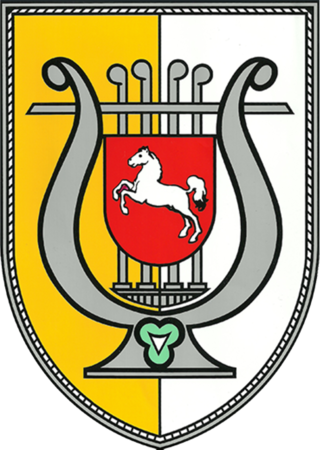Oberstleutnant is a senior field officer rank in several German-speaking and Scandinavian countries, equivalent to lieutenant colonel. It is currently used by both the ground and air forces of Austria, Germany, Switzerland, Denmark, and Norway. The Swedish rank överstelöjtnant is a direct translation, as is the Finnish rank everstiluutnantti.

Garmisch-Partenkirchen is an Alpine ski town in Bavaria, southern Germany. It is the seat of government of the district of Garmisch-Partenkirchen, in the Oberbayern region, which borders Austria. Nearby is Germany's highest mountain, Zugspitze, at 2,962 metres (9,718 ft) above sea level.

The German Army is the land component of the armed forces of Germany. The present-day German Army was founded in 1955 as part of the newly formed West German Bundeswehr together with the Marine and the Luftwaffe. As of 2024, the German Army had a strength of 63,047 soldiers.

Murnau am Staffelsee is a market town in the district of Garmisch-Partenkirchen, in the Oberbayern region of Bavaria, Germany.
The Military Counterintelligence Service is one of the three federal intelligence agencies in Germany, and is responsible for military counterintelligence within Bundeswehr. The MAD is subordinate to the Federal Ministry of Defense.

The Großer Zapfenstreich is a military ceremony performed in Germany and Austria. It is similar to the military tattoo ceremony performed in English-speaking countries, and is the most important ceremonial act executed by the German federal armed forces, the Bundeswehr, and by the Austrian federal armed forces Bundesheer. The Zapfenstreich is performed only during national celebrations and solemn public commemorations, to honour distinguished persons present at such special events. Examples are the farewell ceremony for a German federal president, or at the conclusion of large military exercises. It takes place in the evening hours and consists of a military formation of at least one military band, two platoons of armed infantrymen, and two lines of soldiers carrying torches, in total about 400 men.

Schloss Elmau is a four-story castle and national monument with hipped roof, tower and porch, situated between Garmisch-Partenkirchen and Mittenwald in a sanctuary of the Bavarian Alps, Germany. It lies at the foot of the Wetterstein mountains in a Naturschutzgebiet, belonging to the Krün municipality. It was built by philosopher and theologian Johannes Müller and architect Carl Sattler between 1914 and 1916.

Karl Ernst Ulrich de Maizière was a German general. He served in the army of three German states: the Reichswehr of the Weimar Republic, the Wehrmacht of Nazi Germany, and the German Army of West Germany, with a total of 32 years in uniform, the last five as Inspector General of the Bundeswehr. He retired in 1972 at the age of sixty and lived in retirement until his death in August 2006.

Mittenwald is a German municipality in the district of Garmisch-Partenkirchen, in Bavaria.

Grainau is a municipality in the district of Garmisch-Partenkirchen, in southern Bavaria, Germany. It is located at the foot of the Zugspitze mountain, the tallest mountain in Germany in the sub-mountain range of the Wetterstein Alps which is a branch off the main mountain range it is connected to, the Alps. Lake Eibsee in Grainau lies at the foot of the Zugspitze surrounded by forest.

With a contingent of 4,350 soldiers and policemen, Germany was one of the main contributors of troops to coalition operations in Afghanistan. Although German troops mainly operated in the comparatively quiet north of the country, the Bundeswehr suffered a number of casualties during participation in the International Security Assistance Force mission in Afghanistan.

The George C. Marshall European Center for Security Studies is a bi-national United States Department of Defense and Federal Ministry of Defence (Germany) security and defense studies institute. When the Marshall Center was founded in 1993, its mission was to create a more stable security environment by advancing democratic institutions and relationships, especially in the field of defense; promoting active, peaceful, security cooperation; and enhancing enduring partnerships among the nations of North America, Europe, and Eurasia. As of Oct. 1, 2014, the Marshall Center's regional mission changed to a transnational one based on an Office of the Secretary of Defense directive to change from a European to a global participants' base.

Klaus Reinhardt was a German Army general. He was the commander of the German Army Forces Command, the NATO Joint Headquarters Center, and KFOR in Kosovo. Reinhardt died on 30 November 2021, at the age of 80. He was the son of Nazi bureaucrat Fritz Reinhardt.

The 1st Mountain Division was a West German mountain infantry formation. It was part of the II Corps of the Bundeswehr. In the wake of military restructuring brought about by the end of the Cold War, the 1st Mountain Division was disbanded in 2001.
Achim Lidsba was a Major General of the Army and the German Armed Forces and since 14 July 2011 Commander of the Armed Forces Staff College in Hamburg.

There are 15 military bands of the Bundeswehr, including those of the German Army, Air Force, Navy, and joint bands. Before 2009, the military musicians of the Bundeswehr constituted a joint specialist service, the Military Music Service, subordinate to the Armed Forces Office. In 2009, as part of a larger reorganisation of the Bundeswehr, the organization of the Military Music Service was replaced by the new Military Music Center of the Bundeswehr in Bonn, and several bands were disbanded. The bands of the Bundeswehr provide music for official ceremonies such as the Großer Zapfenstreich and the swearing-in of new recruits. In addition to their traditional military music repertoire, they perform concert band and light music, as well as genres such as jazz, rock, and pop.

The Cyber and Information Domain Service (CIDS) (German: Cyber- und Informationsraum, German pronunciation:[ˈsaɪ̯bɐʊntɪnfɔʁmaˈt͡si̯oːnsˌʁaʊ̯m] ; CIR) is the youngest branch of the German Armed Forces, the Bundeswehr. The decision to form an organizational unit was presented by Defense Minister Ursula von der Leyen on 26 April 2016, becoming operational on 1 April 2017. It is headquartered in Bonn.

The Staff Band of the Bundeswehr is the main representative brass band of the Bundeswehr, stationed in Berlin. It works together with the Wachbataillon in the Berlin Garrison Command, having responsibility for protocol during state receptions of the Federal President, Chancellor and the Minister of Defense. The band is responsible for performing pieces such as the anthems of foreign countries as well as the Preussischer Präsentiermarsch during arrival honors ceremonies for visits by foreign leaders to Germany. It is among 6 other German military bands that fall under the command of the Joint Support Service.

The Army Band Hannover is a musical band unit of the German Army based in Hannover, Lower Saxony.

The Training Band of the Bundeswehr is the Bundeswehr's training music corps. It is responsible for training new musicians. It was created in Siegburg on 1 July 1960 and has been stationed in Hilden since 1969. It is subordinate to the other 13 music bands of the Bundeswehr and the Military Music Center of the Bundeswehr in Bonn. Every year the training band goes on a concert tour to demonstrate the success of their training. The task of the training band is to pave the way for young musicians to become professionals and to prepare them for future service in the Bundeswehr. Many members of the vand come from the Robert Schumann Hochschule in Düsseldorf. It consists of a teaching staff, three officers and one bandmaster, which coordinate and manage the training company, which offers can accommodate up to 150 musicians.




















